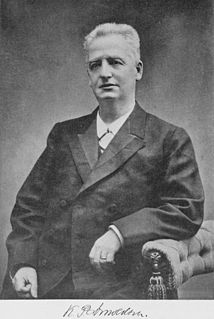A Quote by William Winwood Reade
One fact must be familiar to all those who have any experience of human nature - a sincerely religious man is often an exceedingly bad man.
Related Quotes
Nature is man's inorganic body -- that is to say, nature insofar as it is not the human body. Man lives from nature -- i.e., nature is his body -- and he must maintain a continuing dialogue with it is he is not to die. To say that man's physical and mental life is linked to nature simply means that nature is linked to itself, for man is a part of nature.
In philosophical anthropology, ... where the subject is man in his wholeness, the investigator cannot content himself, as in anthropology as an individual science, with considering man as another part of nature and with ignoring the fact that he, the investigator, is himself a man and experiences this humanity in his inner experience in a way that he simply cannot experience any part of nature.
A small knowledge of human nature will convince us, that, with far the greatest part of mankind, interest is the governing principle... Few men are capable of making a continual sacrifice of all views of private interest, or advantage, to the common good. It is vain to exclaim against the depravity of human nature on this account; the fact is so, the experience of every age and nation has proved it and we must in a great measure, change the constitution of man, before we can make it otherwise. No institution, not built on the presumptive truth of these maxims can succeed.
Every human being shall see in each and all of his fellow-men a hidden divinity... that every human being is made in the likeness of the Godhead. When that time comes there will be no need for any religious coercion; for then every meeting between one man and another will of itself be in the nature of a religious rite, a sacrament.
Down these mean streets a man must go who is not himself mean, who is neither tarnished nor afraid...He is the hero, he is everything. He must be a complete man and a common man and yet an unusual man. He must be, to use a rather weathered phrase, a man of honor, by instinct, by inevitability, without thought of it, and certainly without saying it. He must be the best man in his world and a good enough man for any world
The emotional aspects of a wilderness experience might be compared to a religious experience. It is particularly valuable for those people whose unconscious associations of pain and discomfort in relationships to man render a deity in human form impossible. Christianity is unacceptable to some people because of the use of the human symbol, but some who can't accept Christ can gain a tremendous sense of peace from relating to uncontaminated areas.
Compromise" is so often used in a bad sense that it is difficult to remember that properly it merely describes the process of reaching an agreement. Naturally there are certain subjects on which no man can compromise. For instance, there must be no compromise under any circumstances with official corruption, and of course no man should hesitate to say as much.
Human nature has its fatal weaknesses, but 'love' means embracing the whole of human nature, the bad within the good, the benign within the malicious, the beautiful within the tragic. 'Love' is the experience of this whole, its unfinished parts, including those of one's own in relation to those of the other.








































